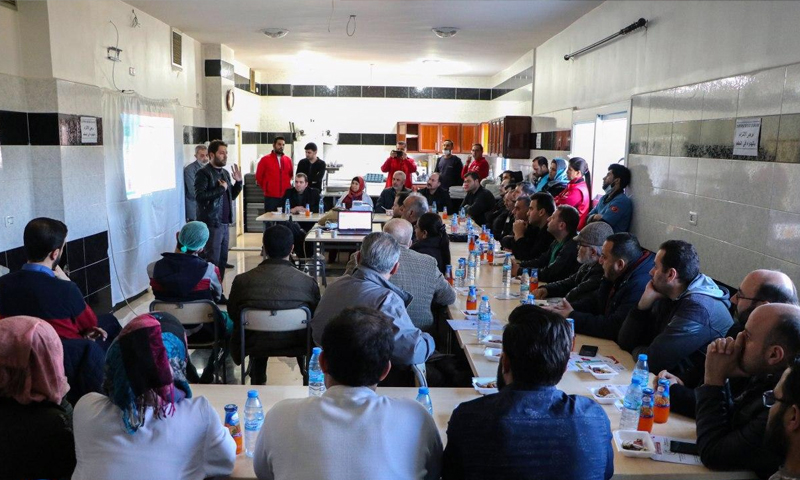



Local councils and health directorates in the northern countryside of Aleppo organized a coronavirus awareness campaign. They implemented preventive measures to address the spread of the coronavirus at a time when no confirmed case has been recorded in Syria so far.
In cooperation with the Health Directorate in the Turkish state of Hatay, health offices of the local councils of Afrin, al-Bab, and Jarablus have started carrying out awareness campaigns for doctors and managers of medical organizations, on 3 March of this year.
The health offices also distributed awareness leaflets and held meetings, lectures, and workshops explaining the biological nature of the virus and how to deal with it.
The coordinator of the Early Warning, Alert and Response Network in the city of al-Bab, Mohamed al-Saleh, told Enab Baladi that the active preparation for confronting the coronavirus lies in educating people about how to act if they know of an infected case, and how to protect oneself if the virus enters the region.
The significance of these workshops is to introduce the virus in light of the wrong circulation by the media outlets about the disease, whether in exaggerating or reducing its severity. It also provides citizens with accurate scientific information and facts about the virus, according to the organizers.
The workshops are part of a set of steps taken by the health directorate in the city of al-Bab, including:
1- Establishing an isolation room in al-Bab Hospital.
2- Providing the border crossings with some necessary equipment to detect the patients with the disease.
3- Spreading coronavirus public health awareness campaigns, leaflets, and posters.
4- Communicating with the Early Warning, Alert and Response Network and creating a communication network amongst doctors and health care workers to manage information and report suspected or confirmed cases of coronavirus.
The introductory workshops contain the provision of means of protection, amid the absence of essential vaccines and medicines needed to treat coronavirus cases.
The directorate of health in Jarablus circulated leaflets containing health care instructions to the civil institutions in the city and requested to clean and disinfect the school restrooms regularly, according to the director of health in the city, Issam Jumaa.
Jumaa stressed that anyone with a fever, a temperature higher than 37.5 degrees Celsius, is not allowed to enter Jarabulus city in fear of virus spread, and he will be subjected to special medical examinations and detailed analyzes to be sent to Turkey.
He referred to the readiness of Jarablus Hospital to contain the virus, as it includes a health isolation room with the necessary medical equipment.
The Director of Health in the al-Bab local council, Kazem al-Hammoud, earlier made statements to Enab Baladi, pointing out that they coordinate with Turkey regarding the medical issue of the virus, because they believe that the outbreak of coronavirus disease in one of the two countries threatens to spread in the other country.
Al-Hammoud added that there is a Turkish consultant taking part in all measures taken by the health directorate in the area.
Al-Hammoud indicated the presence of well-trained medical cadre, medical health facilities, and a place designated to isolate suspected or confirmed coronavirus patients in addition to a group of many doctors. The doctors are asked to report any suspected case of coronavirus infection; samples are sent to a lab for analysis to confirm or deny the case.
Medical sources in northern Syria denied recording cases with “the emerging coronavirus.”
At the same time, the so-called Syrian Interim Government (SIG) has stopped the imports of Chinese products to the opposition-controlled areas in order to ensure the safety of the people in the “liberated” Syrian regions.
According to a report by the World Health Organization (WHO), the WHO management team supports health in Syria in eight ways, the most prominent of which is detecting and responding to disease outbreaks and epidemics. Adversely low vaccination rates in some conflict areas, coupled with a breakdown of water and sanitation systems and pockets of malnutrition, are making disease outbreaks in Syria more frequent and deadly.
Until the moment of writing this report, the number of people infected with the coronavirus worldwide reached more than 101,000. More than 3,492 died, and the central countries of its spread were China, South Korea, Iran, and Italy.
Several confirmed cases of coronavirus infection have been reported in most of the neighboring countries, such as Iraq, Lebanon, and Jordan. However, there is no official statement about confirmed cases of coronavirus infection in Syria except what was stated by the associate director of communicable and chronic diseases at the Ministry of Health, Hani al-Lahham, to the local “Melody FM” radio, On 29 February.
Al-Lahham highlighted two suspected cases from Iran were transferred to al-Mujtahid hospital, were immediately quarantined and were followed up daily, without specifying the date of their arrival.
Al-Laham said that the two cases recovered from the symptoms and that they were discharged from the hospital, without confirming their definite infection by a coronavirus. However, they are still followed up even after they left the hospital.
if you think the article contain wrong information or you have additional details Send Correction